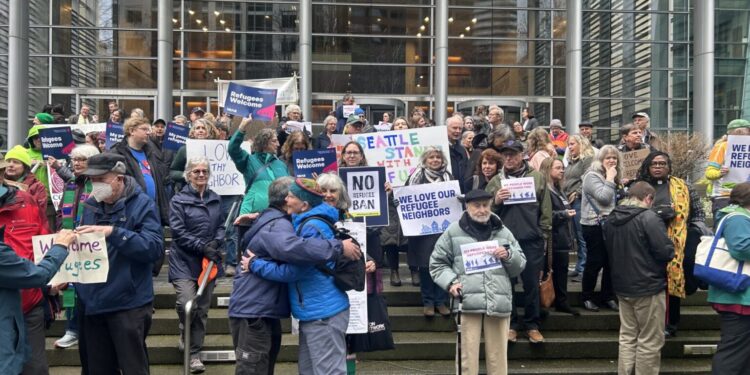A federal judge in Seattle has ruled that refugees from countries affected by the Trump administration’s travel ban must be allowed to enter the United States—marking a significant legal win for resettlement organizations and displaced individuals awaiting admission.
The ruling, issued Monday by U.S. District Judge Jamal Whitehead, directs the federal government to admit approximately 80 refugees who were previously cleared but barred from entering due to former President Donald Trump’s executive order halting refugee admissions.
Judge Whitehead’s decision also broadens the potential pool of those eligible for entry, stating that the U.S. must consider refugees whose travel was delayed prior to the implementation of the ban—even if their trips were scheduled before Trump took office.
The case was brought forward by several refugee advocacy groups, including Lutheran Community Services Northwest based in Tacoma, and individual sponsors impacted by the refugee freeze. Among them is a Bellevue woman who applied to sponsor a refugee family from Afghanistan—a country included in the travel ban.
In a February opinion, Whitehead, a Biden appointee, found that the Trump administration’s policy likely violated the constitutional separation of powers. However, the 9th U.S. Circuit Court of Appeals later narrowed that decision, limiting refugee admissions to those who had completed application procedures and arranged travel before the executive order took effect.
Still, Whitehead’s most recent ruling reinstates a key component of the case. It compels the federal government to admit refugees who met the appeals court’s three-part test and were scheduled to arrive within two weeks of the January 20 order. The government identified 160 such individuals.
Magistrate Judge Michelle Peterson has been assigned to review additional refugee cases involving more than 4,000 applications—representing over 12,000 individuals—whose arrivals were set for after February 3.
Judge Whitehead further ordered the federal government to include in its admissions those whose travel was canceled between December 1 and January 20, and instructed officials to identify all qualifying cases under the appellate criteria within one week. The court also mandated expedited processing for unaccompanied refugee minors and Afghan nationals temporarily housed at a U.S. military facility in Qatar.
Resettlement organizations expressed cautious optimism. Lutheran Community Services Northwest said in a statement it is “hopeful that in the short term we may be able to welcome a small number of families from the pool of 160 so-called ‘injunction protected’ refugees.”
“In the longer term,” the statement continued, “we hope there will be many additional families admitted into the country and resettled in the Northwest under the purview of Magistrate Judge Peterson.”
The Department of Justice, meanwhile, argued against expanding refugee entry eligibility, with DOJ attorney Joseph McCarter describing the requests as a “baseless and unrestrained expansion” of the appeals court’s ruling.
Whitehead’s order represents another legal setback for policies initiated under the Trump administration that sought to dramatically scale back refugee admissions. Affected organizations maintain that the number of impacted refugees is likely higher than government estimates, citing processing delays and preemptive cancellations tied to the executive order.







